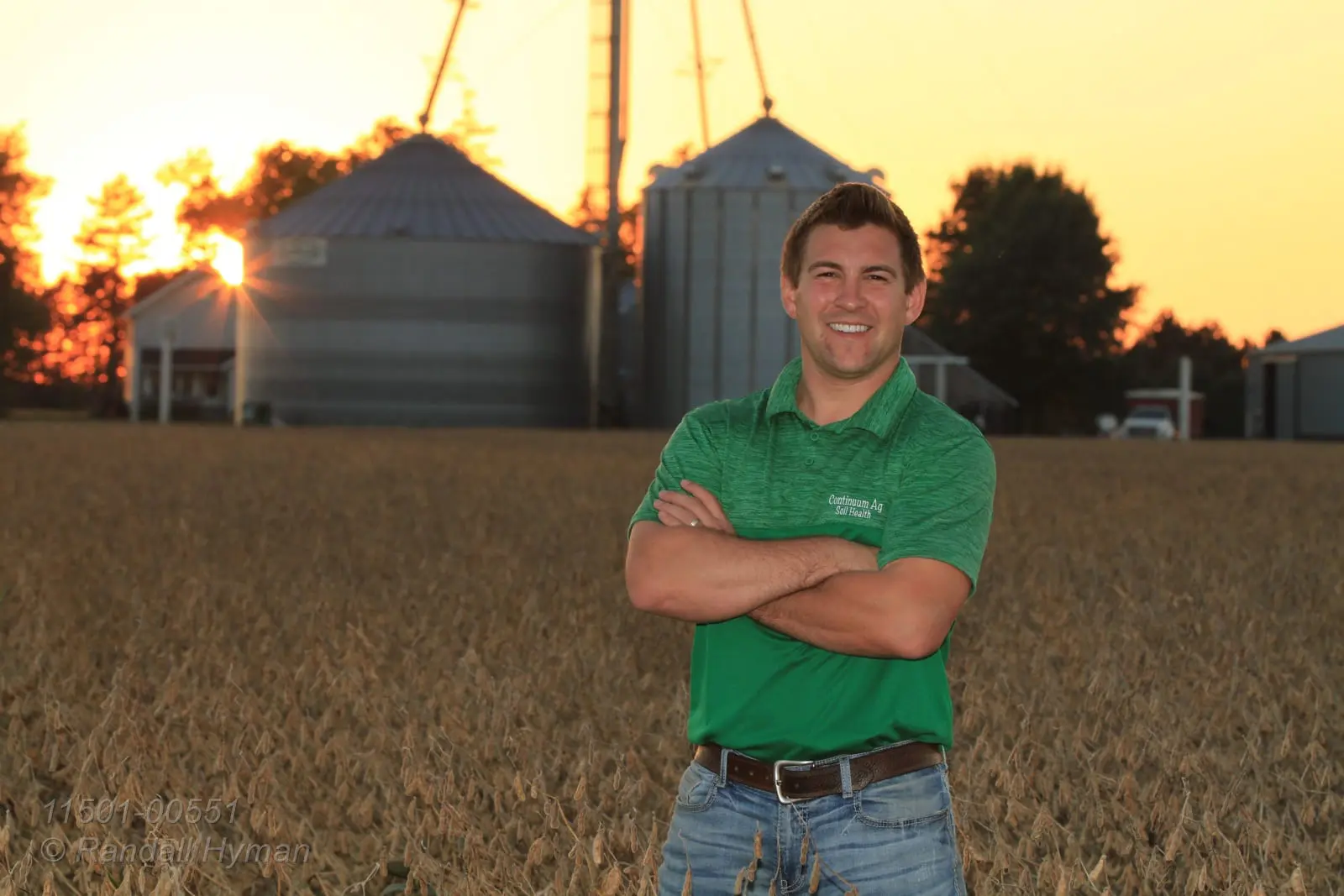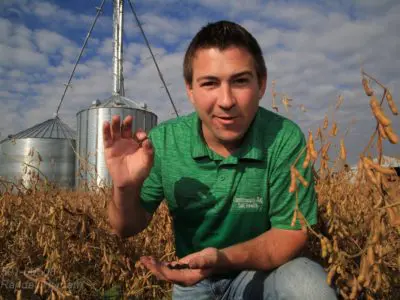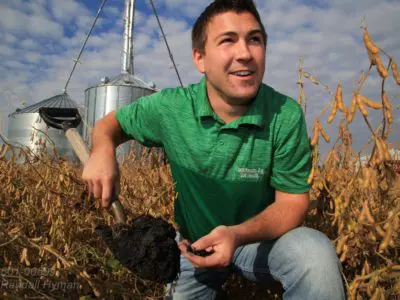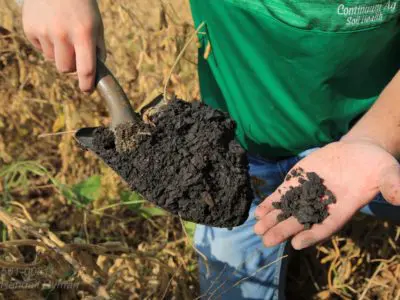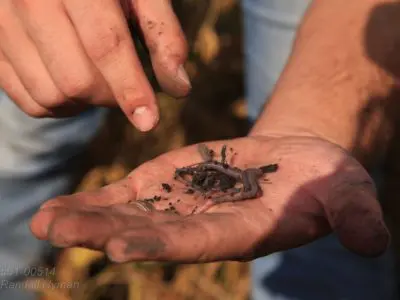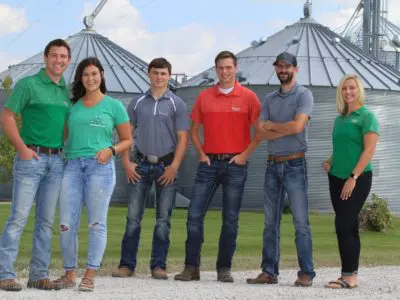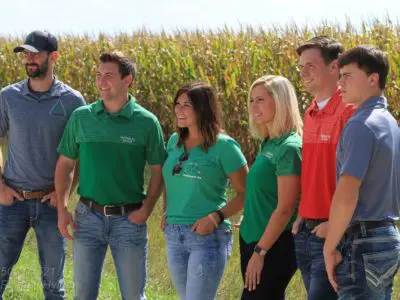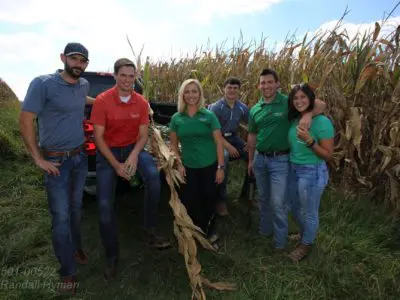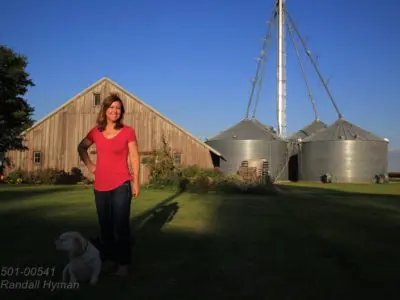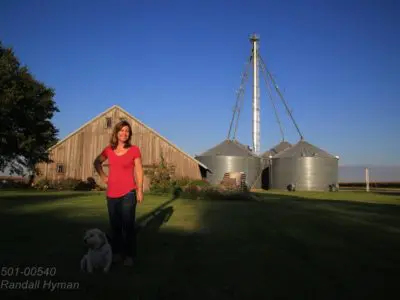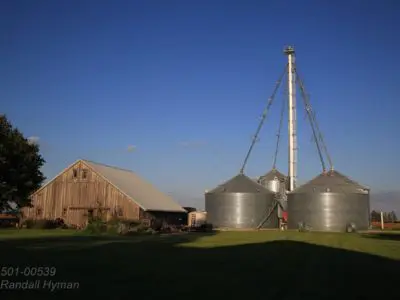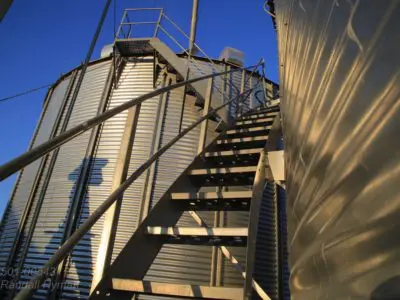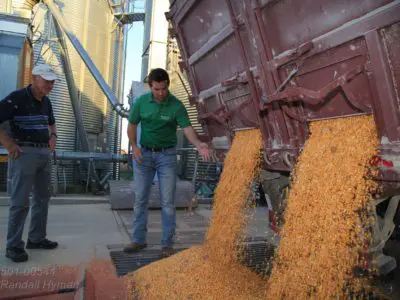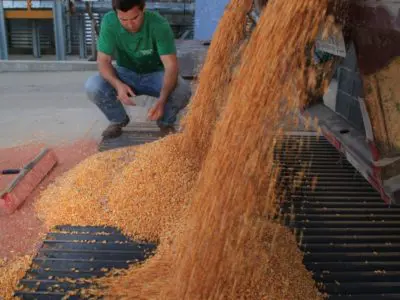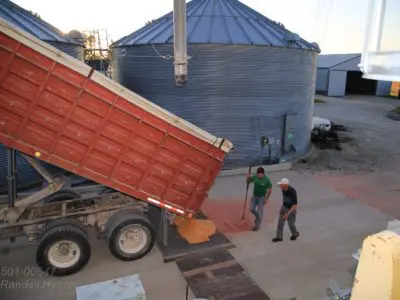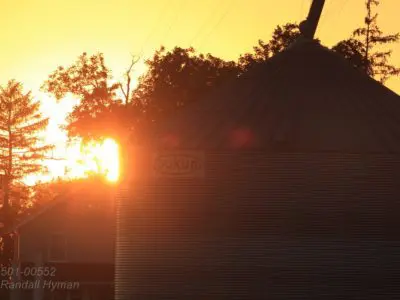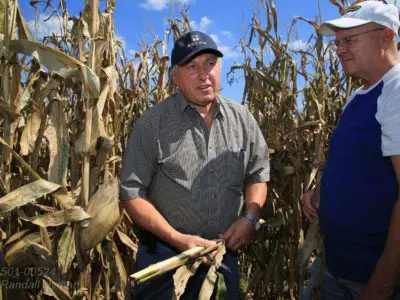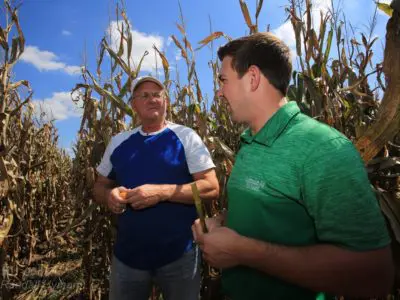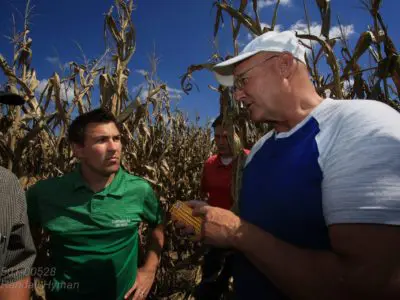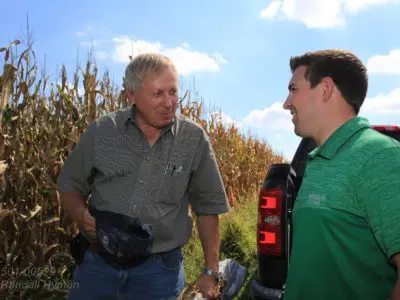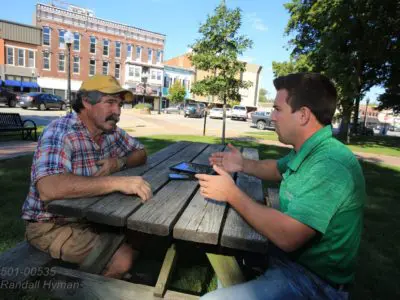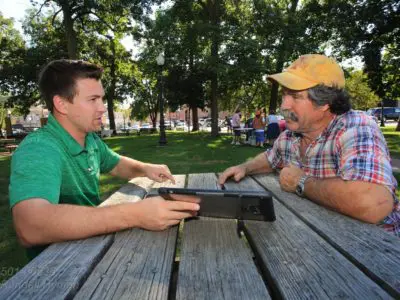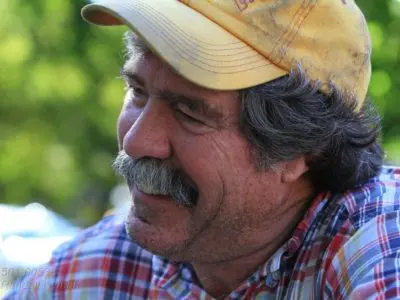Mitchell Hora digs soil, especially if it’s in a soybean field and full of worms. Armed with a shovel, iPad and college degree, he represents a new generation of U.S. determined to get more from the land by working with it. His mission is to spread the word about soil health and sustainability while helping farmers reap greater profits and produce healthier, more protein-dense and nutrient-rich crops.

For Hora, sustainability starts in his own backyard. When he digs a spadeful of soil in his father’s soybean field, it comes up wriggling with worms and black organic material. He can barely contain his excitement.
- Mitchell Hora, owner of Continuum Ag, stands in father’s soybean field consulting with client on cell phone about increasing farm profits through improved soil health; Washington, Iowa.
- Mitchell Hora, owner of Continuum Ag, examines soil in father’s soybean field that he has helped improve through cover crop and no-till practices; Washington, Iowa.
- Mitchell Hora, owner of Continuum Ag, holds worm from soil in father’s soybean field that he has helped improve through cover crop and no-till practices; Washington, Iowa.
- Mitchell Hora, owner of Continuum Ag, examines soil in father’s soybean field that he has helped improve through cover crop and no-till practices; Washington, Iowa.
- Mitchell Hora, owner of Continuum Ag, examines soil in father’s soybean field that he has helped improve through cover crop and no-till practices; Washington, Iowa.
- Mitchell Hora, owner of Continuum Ag, examines soil in father’s soybean field that he has helped improve through cover crop and no-till practices; Washington, Iowa.
- Mitchell Hora, owner of Continuum Ag, examines soil in father’s soybean field that he has helped improve through cover crop and no-till practices; Washington, Iowa.
- Mitchell Hora, owner of Continuum Ag, examines soil in father’s soybean field that he has helped improve through cover crop and no-till practices; Washington, Iowa.
- Mitchell Hora, owner of Continuum Ag, examines soil and worms in father’s soybean field that he has helped improve through cover crop and no-till practices; Washington, Iowa.
“With cover crops, we’re keeping living roots out here all the time, putting sugar into the ground and feeding microbes,” says Hora as several eager worms manage to slither out of his hand. “So the little guys are being eaten by the bigger guys and then eaten by the worms.”
The soil wasn’t this rich a couple of years ago when he and his dad began planting trial winter cover crops like cereal rye, radishes and clover (supplied by the Iowa Soybean Association) to control weeds and prevent erosion.
Hora’s passion has deep roots. He comes from Iowa’s Washington County, renowned for its conservation culture, and his family has been farming its rich, loamy Kalona soil for generations.

In 2014, while still in school at Iowa State University, he started his own agricultural consulting business, now called Continuum Ag. In a graduating class of over 600 students, he was one of only three grads starting out with their own businesses.
Today, just over a year out of college, 24-year-old Hora employs two agronomists and a publicist. Continuum Ag samples soils from all over the Midwest to profile nutrients, microbial activity and general physical properties such as soil structure. They also monitor product trials of new fertilizers, biological additives and nutrient stabilizers.
- Mitchell Hora, owner of Continuum Ag, poses with wife Tympest and his entire team in front of grain bin complex on father’s farm; Washington, Iowa.
- Mitchell Hora (center), owner of Continuum Ag, poses with his employees in front of grain bin complex on father’s farm; Washington, Iowa.
- Mitchell Hora (center), owner of Continuum Ag, poses with his employees in front of grain bin complex on father’s farm; Washington, Iowa.
- Mitchell Hora, owner of Continuum Ag, poses with wife Tympet and his entire team by cornfield on father’s farm; Washington, Iowa.
- Mitchell Hora, owner of Continuum Ag, poses with wife Tympest and his entire team by cornfield on father’s farm; Washington, Iowa.
- Mitchell Hora, owner of Continuum Ag, poses with wife Tympest and his entire team in cornfield on father’s farm; Washington, Iowa.
“To be fully sustainable, we have to improve all three parameters: chemistry, biology and physical properties,” says Hora. “Healthier soils sequester more carbon from the atmosphere and reduce greenhouse gases. And better soil structure means we’re holding more water, which makes us less susceptible to drought and floods. This sets us apart from producers around the world because our soils are more forgiving.”
Continuum Ag is currently involved in a pilot project to establish a universal soil-test tool and create a benchmark for measuring sustainability, starting with farms in Minnesota that grow food-grade soybeans for Asian markets. Hora applies those same testing procedures to soils from Zimbabwe, Zambia and Kenya, and he recently visited South Africa to consult with clients about their own brand of agriculture.
“It’s not just soybeans and corn there,” says Hora. “We’re talking wheat, peanuts, citrus, vegetables and grapes. Some of the best wines in the world come from South Africa. The properties of soil are different in their deserts and mountainsides, but the ways we assess are the same.”
In Washington County, visionary farming is a way of life. Fifteen percent of the land is already planted in winter cover crops, twice as much any other county in Iowa. In the 1980s, Hora’s dad was among the first to join a revolution in agriculture when he stopped the time-honored practice of plowing soil and turned to no-till farming.

Iowa has since developed a Nutrient Reduction Strategy, with the goal of a 45 percent cut in nitrogen and phosphorous runoff through dramatic increases of no-till farming and cover crops (still just 2 to 3 percent percent statewide). Less erosion allows soil to retain its nutrients and improves downstream drinking water as well as ameliorating the vast oxygen-depletion zone at the Mississippi River’s mouth in the Gulf of Mexico.
- Theresa Hora poses near grain bin complex on her family farm near Washington, Iowa.
- Theresa Hora poses near grain bin complex on her family farm near Washington, Iowa.
- Grain bin complex on Hora farm near Washington, Iowa.
- Rust tints vintage grain bin amid cornfields on the Hora farm near Washington, Iowa.
- Grain bin complex on Hora family farm near Washington, Iowa.
- Grain bin complex on Hora family farm near Washington, Iowa.
- Mitchell Hora and his grandfather watch corn pour through loading grate at grain bin complex during September harvest on the Hora family farm near Washington, Iowa.
- Mitchell Hora and his grandfather watch corn pour through loading grate at grain bin complex during September harvest on the Hora family farm near Washington, Iowa.
- Mitchell Hora watches corn pour through loading grate at grain bin complex on the Hora family farm during September harvest near Washington, Iowa.
- Mitchell Hora and his grandfather watch corn pour from truck through loading grate at grain bin complex on the Hora family farm near Washington, Iowa.
- Mitchell Hora and his grandfather watch corn pour from truck through loading grate at grain bin complex on the Hora family farm near Washington, Iowa.
- Setting sun silhouettes grain bin at Hora family farm near Washington, Iowa.
Having living roots in the soil throughout winter preserves soil structure and sustains the microorganisms that are so vital to healthy plants. Complex structure also makes soil act like a sponge. With lots of tiny holes and tubules created by the roots and worms, it retains water and doesn’t disintegrate.
Tilling, or disking, the soil destroys that structure, disrupts the microbial community, releases greenhouse gases and makes farms steadily less healthy, Hora explains. Like doctors taking patients’ vital signs and sampling blood, Continuum Ag’s team interprets soil tests and shows farmers how to improve their land’s health and productivity.
“We use the Haney soil health test to evaluate actual plant-available nutrients,” Hora says. “Plants secrete carbon and sugar into the soil through photosynthesis. That’s why it’s so important to have living roots going all the time. Roots sustain the microorganisms that process organic matter. The Haney test helps us be more efficient with our fertilizer use.”
- Brian Hora examines cornstalk for disease on his farm near Washington, Iowa.
- Agronomists Bob Streit and Mark Dodd examine corn stalk for disease on Hora farm near Washington, Iowa.
- Agronomists Bob Streit and Mark Dodd show Mitchell Hora of Continuum Ag diseased corn on the Hora farm near Washington, Iowa.
- Agronomists Bob Streit and Mark Dodd show Mitchell Hora of Continuum Ag diseased corn on the Hora farm near Washington, Iowa.
- Agronomist Mark Dodd talks with Mitchell Hora of Continuum Ag in cornfield on the Hora farm near Washington, Iowa.
- Agronomist Mark Dodd discusses corn disease with Mitchell Hora of Continuum Ag on the Hora farm near Washington, Iowa.
- Agronomist Bob Streit talks with Mitchell Hora of Continuum Ag in cornfield on the Hora farm near Washington, Iowa.
- Agronomist Bob Streit talks with Mitchell Hora of Continuum Ag in cornfield on the Hora farm near Washington, Iowa.
Like fertilizers, overuse of herbicides wastes time and money. Tilling, or disking, is even worse. Although it temporarily kills weeds and aerates the upper soil, agronomists now recognize that tilling does more harm than good. When rains hit, the soil falls apart and erodes. Cover crops that grow throughout winter offer an alternative to both herbicides and tilling that controls weeds while preserving soil, improving yields and producing more protein-dense soybeans and corn.
“For decades, big agriculture treated soil as a dead, static growing medium,” says Hora. “The key is to allow soil to do what it is intended to do, which is to function as a living ecosystem.”
At present, most farmers see cover crops as a risky long-term investment they can ill afford. Hora says his other company, Soil Reporting and Management, may help change that. It uploads independent, third-party soil data and farming practices of individual farms to a central website so that customers can see where their food comes from and farmers can profit from sustainable agriculture.
- Mitchell Hora, owner of Continuum Ag, reviews soil health test results with client farmer in town square of Washington, Iowa.
- Mitchell Hora, owner of Continuum Ag, reviews soil health test results with client farmer Rob Stout in town square of Washington, Iowa.
- Mitchell Hora, owner of Continuum Ag, reviews soil health test results with client farmer Rob Stout in town square of Washington, Iowa.
- Mitchell Hora, owner of Continuum Ag, reviews soil health test results with client farmer Rob Stout in town square of Washington, Iowa.
- Mitchell Hora, owner of Continuum Ag, reviews soil health test results with client farmer Rob Stout in town square of Washington, Iowa.
- Mitchell Hora, owner of Continuum Ag, reviews soil health test results with client farmer Rob Stout in town square of Washington, Iowa.
- Portrait of farmer Rob Stout; Washington, Iowa.
“Companies like General Mills, Land O’Lakes and Walmart want to be sustainable, but they don’t have a standardized and independent measure,” says Hora. “We have the data and can connect the consumer with the soil where their food is produced.”
While he says that U.S. yields wouldn’t be where they are without fertilizers, herbicides and pesticides, Hora believes quality is just as important. His dad’s 250 acres of soybeans yield 70 to 80 bushels per acre, hitting over 100 bushels in spots, but Hora sees beyond that.
“It’s not just about yields,” he says. “With the soil being healthier, we’re reducing our nitrogen and phosphorous loss and recycling nutrients to deliver more nutrition. That’s the definition of sustainability.”
